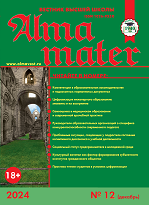UDC 373+159.95
Larisa P. Petukhova, Cand. Sc. (Pedagogy), Assistant Professor, I.G. Petrovsky Bryansk State University, e-mail: petuhowa.larisa@yandex.ru
Natalia V. Seregina, Cand. Sc. (Pedagogy), Assistant Professor, I.G. Petrovsky Bryansk State University, e-mail: nata0479@yandex.ru
Natalia P. Katunina, Dr. Sc. (Biology), Professor, I.G. Petrovsky Bryansk State University, e-mail: npkatunina@mail.ru
Elena N. Stratienko, Dr. Sc. (Medicine), Professor, I.G. Petrovsky Bryansk state university, Bryansk, e-mail: e-mail: stratienko@list.ru
The article presents results of a study of the characteristics of motivation for educational activities in primary school age and interpersonal relationships in the class, as well as their mutual influence. The relevance of studying the relationship between learning motivation and interpersonal relationships in the class is of great importance, since understanding the nature of their relationships and methods of communication between students is important for determining the factors influencing the atmosphere in the class, the success of learning, and the social development of children in general. When studying the research problem, methods were used to diagnose the direction of educational motivation, motives for educational activities, the level of school motivation, as well as the study of interpersonal relationships in the class. The results of correlation analysis using the Pearson coefficient revealed a significant correlation between external and internal motivation, the sociometric index and the attractiveness of the class team, the connection between the level of school motivation and relationships in the class among younger schoolchildren. We also discovered a connection between the sociometric index and broad social motives, prestigious motivation; well-being motivation with a sociometric index and the attractiveness of the class team; narrow social motives with the attractiveness of a cool team. The identified relationships will allow educational psychologists to consider factors that contribute to increased motivation for educational activities and a favorable socio-psychological climate in the team.
Keywords: educational activity, primary school students, motivation of educational activity, motives, interpersonal relationships in the class
References
1. Akhmedova, A.M., Makhmudova, F.A. Social and psychological development of the child in the younger school age. Innovative pedagogical technologies: Proceedings of the I International Scientific Conference (Kazan, October 2014). Kazan: Buk, 2014. P. 134–137. URL: https://moluch.ru/conf/ped/archive/143/6198/ (accessed on: 19.04.2024).
2. Evdokimova, M.M., Arapova, P.I. Formation of cognitive motivation of junior schoolchildren. E-Scio. 2021. P. 1–6. URL: https://cyberleninka.ru/article/n/formirovanie-poznavatelnoy-motivatsii-... (accessed on: 14.04.2024).
3. Zhavoronkova, Yu.M., Kilmasova, I.A. Motivation of learning activities of primary school children. St. Petersburg Educational Vestnik. 2017. No. 1. P. 18–23. URL: https://cyberleninka.ru/article/n/motivatsiya-uchebnoy-deyatelnosti-u-de... (accessed on: 15.04.2024).
4. Zhienbaeva, N.B. Tugulbaeva, A.K. The role of interpersonal relations in the psychological development of the younger schoolchild. Young Scientist. 2018. No. 11 (197). P. 119–121. URL: https://moluch.ru/archive/197/48791/ (accessed on: 20.04.2024).
5. Zelova, M.A. Features of the formation of self-esteem of junior schoolchildren and its interrelation with interpersonal relations. Vestnik of Moscow Information Technology University – Moscow Architectural and Construction Institute. 2018. No. 3. P. 65–67. URL: https://cyberleninka.ru/article/n/osobennosti-formirovaniya-samootsenki-... (accessed on: 16.04.2024).
6. Kovina, M.V. Psychological characteristics of children of primary school age and factors of their successful learning. Nauka i sotsium. 2020. P. 1–7. URL: https://cyberleninka.ru/article/n/psihologicheskie-osobennosti-detey-mla... (accessed on: 16.04.2024).
7. Raimbaev, B.B., Makovetskaya, Yu.G. Motivation of learning: the basics of the organization of the educational organization of psychological and pedagogical education of parents: educational and methodological manual / ed. by A.V. Ilyina. Chelyabinsk: ChIPPKRO, 2019. 56 p. URL: 2e7311bd46073d987f629c03001cc59a.pdf (ipk74.ru) (accessed on: 16.04.2024).
8. Sakhanovskaya, O.N. The concept of interpersonal relations of junior schoolchildren. Humanitarian scientific journal. 2017. No. 1. P. 50–54. URL: https://cyberleninka.ru/article/n/ponyatie-mezhlichnostnyh-otnosheniy-ml... (accessed on: 19.01.2023).











.png)






